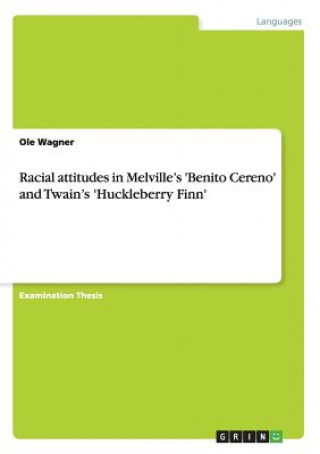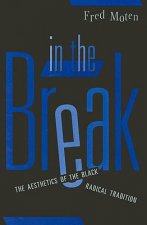
Kód: 05279115
Racial attitudes in Melville's 'Benito Cereno' and Twain's 'Huckleberry Finn'
Autor Ole Wagner
Seminar paper from the year 2008 in the subject English - Literature, Works, printed single-sided, grade: 1,5, University of Heidelberg (Anglistisches Seminar), language: English, abstract: The American literature is a reflection ... celý popis
- Jazyk:
 Angličtina
Angličtina - Vazba: Brožovaná
- Počet stran: 60
Nakladatelství: Grin Publishing, 2009
- Více informací o knize

Mohlo by se vám také líbit
Darujte tuto knihu ještě dnes
- Objednejte knihu a zvolte Zaslat jako dárek.
- Obratem obdržíte darovací poukaz na knihu, který můžete ihned předat obdarovanému.
- Knihu zašleme na adresu obdarovaného, o nic se nestaráte.
Více informací o knize Racial attitudes in Melville's 'Benito Cereno' and Twain's 'Huckleberry Finn'
Nákupem získáte 125 bodů
 Anotace knihy
Anotace knihy
Seminar paper from the year 2008 in the subject English - Literature, Works, printed single-sided, grade: 1,5, University of Heidelberg (Anglistisches Seminar), language: English, abstract: The American literature is a reflection of the socio-political developments in the different stages of the history of the country, and especially slavery is a crucial topic in it. Many works dealing with slavery have been published in the 19th, 20th and 21st century, and some of them have sparked debates that are not only on literary issues. Two of these are Herman Melville s (1819-1891) Benito Cereno (1855) and Mark Twain s (1835-1910, born Samuel Langhorne Clemens) Adventures of Huckleberry Finn (1884). These two novels are often seen as major works in American literary history, and their authors are among the country s most celebrated. Both books have in common that their stories play in the time before the abolition of slavery. Benito Cereno deals with a slave revolt on a ship, while Huckleberry Finn depicts the adventures of its eponymous hero and a runaway slave, Jim. Another feature the novels share is the fact that both have been charged to contain racist and pro-slavery attitudes. This paper will evaluate and analyze these assertions in order to show that they are false because they are based on misunderstandings. It aims to provide a profound delineation of the racial attitudes in the two novels.§The assumption here is that neither Melville nor Twain wrote racist novels. This shall be proven with the help of a close analysis of the narrative perspectives and literary devices used in the books. Both of the stories, as will be shown later, are told by narrators that are far from being easy to grasp without a deeper examination of their character and function. A comprehensive insight into these appears to be beneficial for a better understanding of both of the novels.§The present paper will begin with an exploration of the individual attitudes of the two authors. Although the knowledge of writers opinions can never be used as the sole key to a literary work s interpretation, it can still be helpful to gain an insight into his ideas about the world he or she depicts in his or her fiction. After this, the two novels will be dealt with separately. In a first step, the assertions about each one s racism will be delineated. Then, the narrative perspectives and other literary techniques will be thoroughly analyzed. In a last step, the novels racism will be evaluated with the help of the insights gained about the techniques used. It shall be shown that in the light of this, neither Benito Cereno nor Huckleberry Finn are racist books.
 Parametry knihy
Parametry knihy
Zařazení knihy Knihy v angličtině The arts The arts: general issues
1250 Kč
- Plný název: Racial attitudes in Melville's 'Benito Cereno' and Twain's 'Huckleberry Finn'
- Autor: Ole Wagner
- Jazyk:
 Angličtina
Angličtina - Vazba: Brožovaná
- Počet stran: 60
- EAN: 9783640363322
- ISBN: 3640363329
- ID: 05279115
- Nakladatelství: Grin Publishing
- Hmotnost: 91 g
- Rozměry: 210 × 148 × 5 mm
- Datum vydání: 02. July 2009
Oblíbené z jiného soudku
-

Framed Drawing Techniques
592 Kč -

Beginning Drawing Atelier
500 Kč -

Figure Drawing Atelier
455 Kč -

How to Paint Landscapes Quickly and Beautifully in Watercolor and Gouache
578 Kč -

Doodle Invasion
321 Kč -

Tales from the Midnight Masquerade Coloring Book
345 Kč -

Andrew Wyeth
414 Kč -

If you've seen it all, close your eyes
973 Kč -

Everyday Sketching and Drawing
539 Kč -

Art Book, revised edition
786 Kč -

Doodle Fusion
347 Kč -

Something Wicked from Japan
507 Kč -

Art of Still Life
809 Kč -

Practical Color Combinations
507 Kč -

Dali. The Paintings
1190 Kč -

Bosch. The Complete Works
1612 Kč -

Bonsai
757 Kč -

Craft Of The Japanese Sword
902 Kč -

Jack Vettriano 2025 - Wand-Kalender - Broschüren-Kalender - 30x30 - 30x60 geöffnet - Kunst-Kalender
312 Kč -

Golden Kingdoms - Luxury Arts in the Ancient Americas
1548 Kč -

Harry Clarke
730 Kč -

Katsuya Terada Real Size
957 Kč -

Art/Work - Revised & Updated
382 Kč -

Artist at Work, Proximity of Art and Capitalism
426 Kč -

Critical Zones
1634 Kč -

Complete Guide to Fujifilm's X-Pro2 (B&W Edition)
1186 Kč -

Inside Art Deco: A Pictorial Tour of Deco Interiors from their Origins to Today
998 Kč -

In The Break
812 Kč -

How to Visit an Art Museum: Tips for a Truly Rewarding Visit
418 Kč -

Illegal. Street Art Graffiti 1960-1995
972 Kč -

Copy This Book, An Artist's Guide to Copyright
573 Kč -

Die Reise der Bilder
1035 Kč -

Hand Lettering on the iPad with Procreate
526 Kč -

Dynamic Human Anatomy
923 Kč -

Short History of Ireland, 1500-2000
412 Kč -

Flash from the Bowery: Classic American Tatto, 1900-1950
2347 Kč -

Lady in Gold
340 Kč -

Seven Days in the Art World
385 Kč -

Atlas of Dinosaur Anatomy
887 Kč -

Van Eyck
374 Kč -

Wine and Architecture
530 Kč -

Inspired by Nature Sketchbook
378 Kč -

New York City Graffiti: The Destiny Children
1245 Kč -

Shiba Inu Ryuji
258 Kč -

Reductionism in Art and Brain Science
556 Kč -

Art of Horror
914 Kč -

God's Man, A Novel in Woodcuts
304 Kč -

domus 1930s
558 Kč -

Nude Posing Guide
541 Kč
Osobní odběr Praha, Brno a 12903 dalších
Copyright ©2008-24 nejlevnejsi-knihy.cz Všechna práva vyhrazenaSoukromíCookies






 Vrácení do měsíce
Vrácení do měsíce 571 999 099 (8-15.30h)
571 999 099 (8-15.30h)